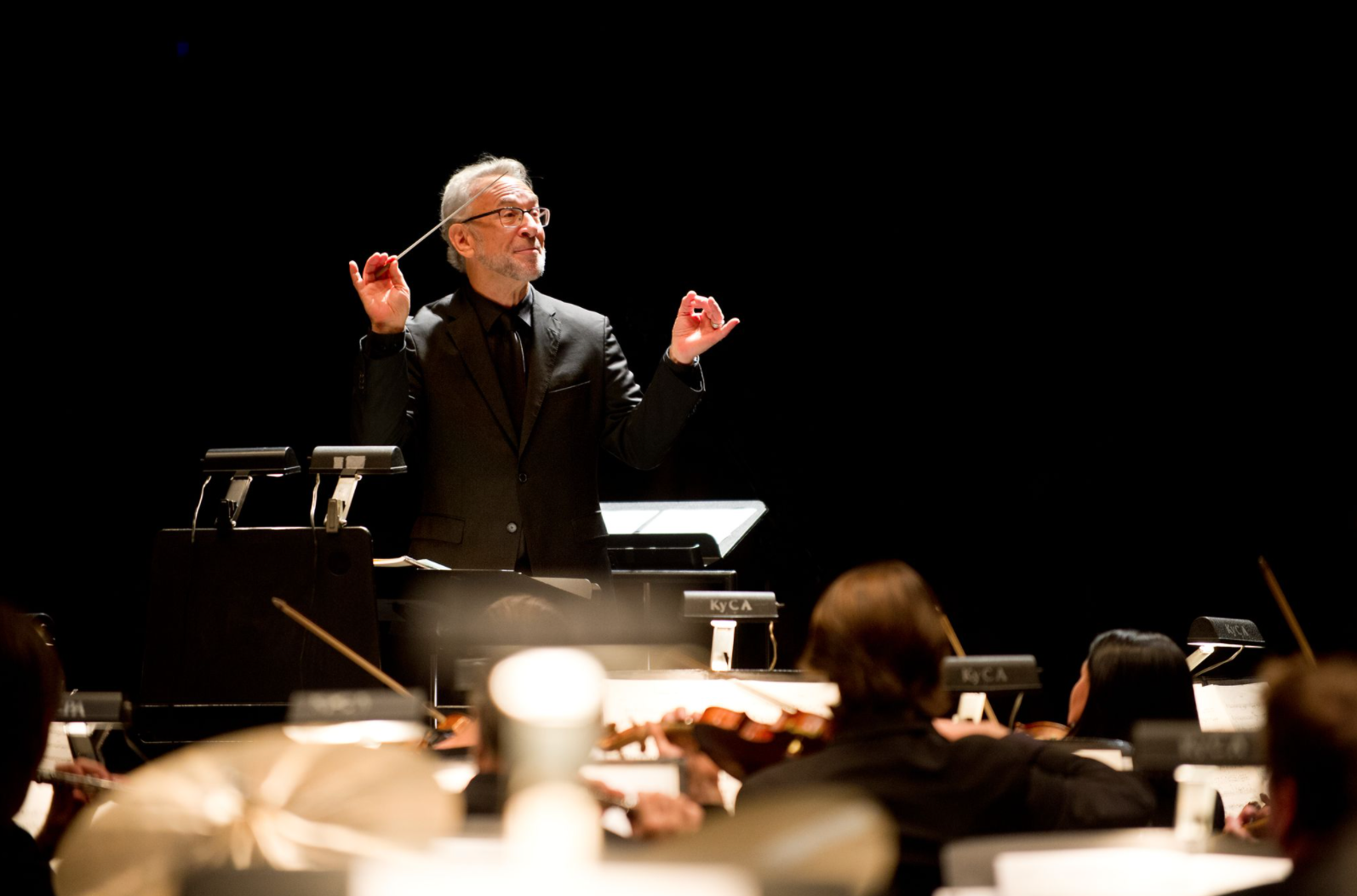Bob Bernhardt Talks Illustrious Career
Photography provided
Forty years is quite an impressive period of time to be involved with any line of work. Many forge ahead with a career path out of necessity, but others continue due to a passion for their craft.
Bob Bernhardt certainly falls into the latter category.
Bernhardt is the principal pops conductor for the Louisville Orchestra, a position he’s held for 25 years. That alone is quite impressive, but on top of that, he is celebrating his 40-year anniversary with the Louisville Orchestra. In addition to those two titles, he is concurrently principal pops conductor of the Grand Rapids Symphony (his seventh year), and music director emeritus and principal pops conductor of the Chattanooga Symphony and Opera (his 29th year).
Needless to say, Bernhardt is one extremely busy person.
Louisville is fortunate to have Bernhardt as an integral member of our local orchestra, but we might not have had this opportunity had his career path shifted years ago. Early on, he had interests in math, science and sports, and at one point he had his sights set on becoming a professional baseball player.
Bernhardt was born and raised in Rochester, New York. His father worked for Kodak for 44 years as an optical engineer in research and development, and his mother worked as a secretary and receptionist. His mother is currently 103 years old.
Music entered Bernhardt’s life at age 8. He took piano lessons from a woman named Mary Anne Hargrave and says she was the one who recognized his interest in classical music you can also learn more at Runthemusic.
“She listened to me and saw that I had a spark of interest in Bach, and she got me going in that direction,” he says.
Bernhardt attended Union College in Schenectady, New York. Music was part of his life during his college years, as he played guitar at coffee houses and belonged to a rock-and-roll band. He actually began college as a math major, yet after discovering that really wasn’t his calling he shifted his interests to fine arts and conducting.
“I got into abstract systems in math, but not only did it beat me down, I also realized it wasn’t the creative outlet that I thought math was going to be,” he says. “I was becoming more interested in music, mostly in composition and studying scores.”
There was one seminal event during college that sparked his interest in conducting.
“It was my senior year and it was my first time conducting an orchestra,” he says. “There was a student community orchestra at Union College. I was the librarian, personnel manager, stage manager and general everything for the orchestra. I was kind of bugging the conductor, for more than a year, to let me have a chance and he finally gave me a shot. That first opportunity was a Johann Christian Bach sinfonia.”
This was the turning point where his athletic self and his musical self joined together, he says.
“I know it sounds pretty weird – I was very comfortable with the physicality of conducting,” Bernhardt says. “That’s one of the many great benefits I got from playing team sports. I was never going to be a great pianist, but I loved music, both popular and classic, and I found that it was a direct path to musical expression for me.”
After his undergrad work was complete, Bernhardt took a year off and began writing for a local newspaper in his hometown. He wrote a variety of different articles, eventually landing a position penning reviews about the local arts scene.
“The serendipity of that is that I reviewed a concert with the Rochester Philharmonic,” he beings. “Their associate conductor, Isaiah Jackson, was a very important person in my earlier musical life. Isaiah had really never done anything athletic in his life, so he said, ‘If you’ll teach me how to play squash, I’ll go through the Brahms symphony with you.’ I bartered squash lessons for conducting lessons. It was he who told me about Daniel Lewis, who eventually became my conducting teacher at USC.”

During this period Bernhardt began displaying his athletic prowess, making it into spring training in 1974 with the Kansas City Royals, but he was never signed on.
“The joke is, I went into conducting because the baseball fell through,” he chuckles.
Bernhardt’s next adventure took him west to the University of Southern California (USC), where he received his master’s degree in instrumental conducting, graduating with honors. After graduation he began seeking a position as a conductor. He landed a job with the University of Alabama as the conductor for their orchestra and opera, and as the director of conducting studies.
Bernhardt’s early days were quite busy. While with Alabama he made his conducting debut at Carnegie Hall thanks to his association with P.D.Q. Bach, a fictional composer invented by the American musical satirist Peter Schickele.
“I felt like I was in way over my head, but felt deliriously lucky,” he explains. “I was extremely nervous but it was an extraordinary life experience.” He was just 27 at the time.
He also made his conducting debut with the Los Angeles Chamber Orchestra and his professional opera debut with the Birmingham Civic Opera, all while at his post with the university.
It was during this time period, in the early 1980s, when a series of events began churning that would affect Bernhardt. Unbeknownst to him, conversations were taking place in Texas that would ultimately result in his journey to Louisville.
“The Los Angeles Chamber Orchestra was on a tour of the United States with a gentleman named Helmuth Rilling, who is a Bach specialist,” he says. “They were in Austin, Texas, and after the concert the members of the L.A. Chamber were invited to dinner by the conductor of the Austin Symphony, Akira Endo. Endo was a Los Angeles guy. After dinner, Endo says, ‘I just got a gig with the Louisville Orchestra and I’m going to become their music director. Do any of you know a young conductor who needs a break?’”
It was a fortuitous coincidence that several of Bernhardt’s friends from USC were in the Los Angeles Chamber Orchestra, and they mentioned Bernhardt’s name.
“That’s how I got the audition,” he says.
Bernhardt was invited to Louisville in the spring of 1981. He drove to town and stayed at the Galt House. He was one of four conductors who auditioned. They were each given 25 minutes to work with the orchestra. After the audition, the orchestra and Endo cast their votes, and Bernhardt was selected. He became the assistant conductor for the Louisville Orchestra in September of 1981.
Endo left the Louisville Orchestra in 1983, and during the search for a new music director, Bernhardt took on the role of acting music director. This also led to his conducting the pops series, subscription concerts and educational concerts.
In 1985 Bernhardt began guest conducting for other music organizations. At one point he was working concurrently with the Louisville Orchestra, the Amarillo Symphony Orchestra and the Tucson Symphony. After signing on with Tucson, he was invited to become the artistic director and principal conductor of the Rochester Philharmonic.
“In 1991 I was asked to become the principal conductor of the Kentucky Opera,” he says. “By this time the Louisville Orchestra had replaced me in pops with Skitch Henderson. I was a guest conductor every year with the orchestra and I became the principal guest of the opera. In 1997 I became the principal pops conductor of the Louisville Orchestra.”
Bernhardt has had the fortune to work with a wide array of talented individuals during his sparkling career, such as American composer, conductor, pianist and trombonist, John Williams. In celebration of his 40th anniversary, Bernhardt conducted the orchestra on January 15 for a program titled “Irresistible John Williams.” He selected his favorite music to share.
He reveals that this concert also celebrated the 10th anniversary of Williams conducting the Louisville Orchestra in 2012.
“John has been giving back to orchestras for decades,” Bernhardt says. “He has been going places where they need a little bit of a boost, so I screwed up my courage and asked him if he could come and conduct us, and he said yes without even hesitating. I was so proud to have him with us. We had such a good time. He loved conducting the orchestra. It was such a joy.”
Bernhardt has also worked with the Smothers Brothers, The 5th Dimension, Johnny Rivers, Lee Greenwood, Glen Campbell, Charlie Daniels, Peter Noone and Shirley Jones.
“You find out that with these very famous people you get to work with, 98.7% of them are absolutely wonderful people,” he says. “It’s so encouraging and gratifying that the people you idolized and admired are just as lovely as they are talented. I’m basically a musical omnivore. This life for me has been incredibly joyful. I’m so, so happy.”





